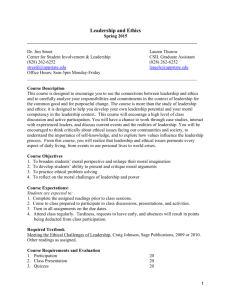syllabusChilAdolLitSNH5001
advertisement
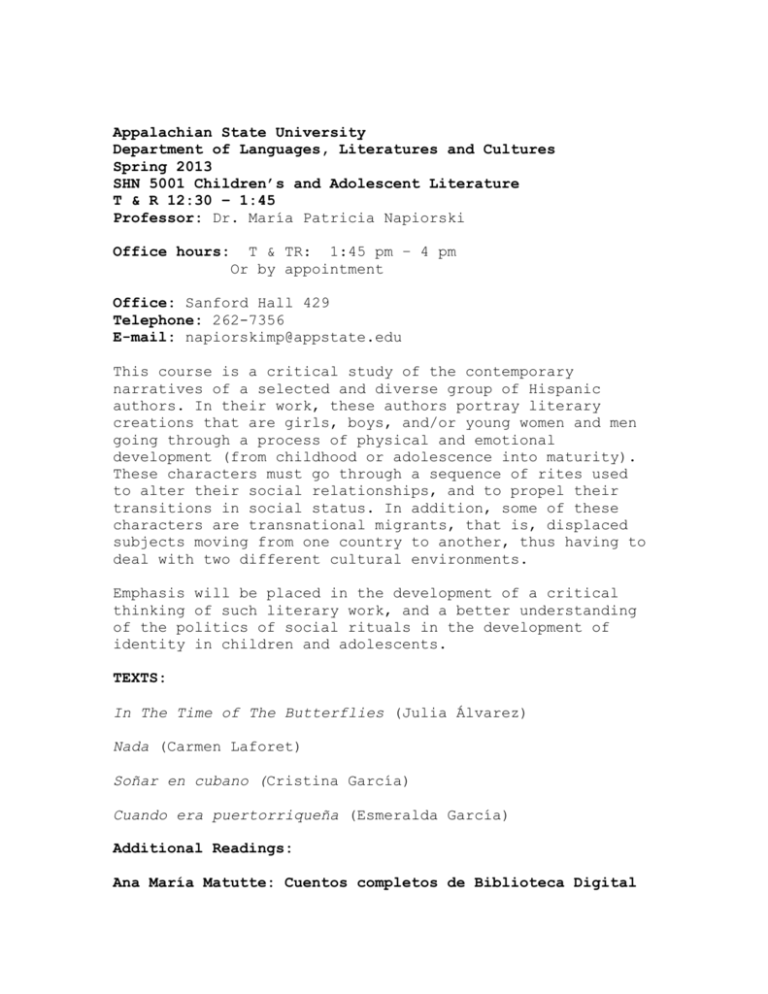
Appalachian State University Department of Languages, Literatures and Cultures Spring 2013 SHN 5001 Children’s and Adolescent Literature T & R 12:30 – 1:45 Professor: Dr. María Patricia Napiorski Office hours: T & TR: 1:45 pm – 4 pm Or by appointment Office: Sanford Hall 429 Telephone: 262-7356 E-mail: napiorskimp@appstate.edu This course is a critical study of the contemporary narratives of a selected and diverse group of Hispanic authors. In their work, these authors portray literary creations that are girls, boys, and/or young women and men going through a process of physical and emotional development (from childhood or adolescence into maturity). These characters must go through a sequence of rites used to alter their social relationships, and to propel their transitions in social status. In addition, some of these characters are transnational migrants, that is, displaced subjects moving from one country to another, thus having to deal with two different cultural environments. Emphasis will be placed in the development of a critical thinking of such literary work, and a better understanding of the politics of social rituals in the development of identity in children and adolescents. TEXTS: In The Time of The Butterflies (Julia Álvarez) Nada (Carmen Laforet) Soñar en cubano (Cristina García) Cuando era puertorriqueña (Esmeralda García) Additional Readings: Ana María Matutte: Cuentos completos de Biblioteca Digital Federico García Lorca: Poemario para niños Gabriela Mistral: Poesía Infantil Manuel Rivas: “La lengua de las mariposas” (This text is available on www1.appstate.edu/~napiorskimp, go to Enlaces, browse page down, the text on the bottom right) Sabine Ulibarrí: “Mi caballo mago” Tomas Rivera: “Primera Comunión” Rosaura Sánchez: “Tres generaciones” Roberta Fernandez: “Amanda” Biblioteca Digital Miguel de Cervantes: Literatura para niños: http://www.cervantesvirtual.com/bib/seccion/bibinfantil/ind ex.html Secondary Sources: Max, Gluckman. “Les Rites de Passage. Essay of the Ritual of Social Relations.” Ibarra, María de la Cruz. “Buscando la vida: Mexican Immigrant Women’s Memories of Home, Yearning and Border Crossing.” Kevane, Bridget. “Latinoamericana: Cultural Identity and the Latina Caribbean Novel as Seen by Julia Alvarez, Cristina García, and Rosario Ferré.” Rivera, Judy. “Mininarratives; Subversive Discourse in Julia Alvarez’s Works.” Jameson, Fredric. “The Seeds of Time.” Rivero, Eliana. “Cuba as Text and Context in Cristina García’s Dreaming in Cuban.” Napiorski, Patricia. “Transgresión y subversion de la madre/esposa en Arrancame la vida de Angeles Mastretta.” Novoa, Bruce. “The U.S. Mexican Border in Chicano Testimonial Wrtiting: A Topological Approach to Four Hundred and Fifty Years of Writing the Border.” Sadowski-Smith, Claudia. “The U.S. Mexican Borderlands Write Back: Cross Cultural Transnationalism in Contemporary U.S. Women of Color Fiction.” Fernandes, Sujatha. “Fear of a Black Nation: Local Rapers, Transnational Crossing, and State Power in Contemporary Cuba.” CLASS REQUIREMENTS: The student is expected to have read the required assignments before each class period. Participation and discussion is essential during the class period. Also, students will be expected to work on assignments and programs developed by the instructor and found in her home page. ATTENDANCE: More than three unjustified absences will lower your final grade by one level (one letter). IF YOU HAVE A VALID EXCUSE, YOU MUST PROVIDE PROOF OF IT (EG. MEDICAL CERTIFICATE) ON THE FIRST DAY YOU RETURN TO CLASS. Three late arrivals will count as 1 absence. GRADING CRITERIA: Presentation: Mid Term: Final Exam: Final Project 10% 25% 25% 40% Explanation of the above grading criteria: Presentation: 20 minute presentation on one of the authors and his/her work. ( Previously approved by the instructor) Mid Term: Consist of a number of essay questions on the texts read. Tuesday March 19. Final Exam: Comprehensive, based on the texts, lectures, and discussions. Format: Essay questions. May 10 a @ 9 am. Essay Paper: A critical fifteen page paper on one of the novels (More details will be provided by the instructor during interviews). Due the last day of class. Academic Honesty: I follow carefully the University and departmental regulations in regards of academic dishonesty in exams, tests, homework etc. Please remember that turning in another person’s work is considered plagiarism, and it results in any appropriate action that I or other university authority deem necessary. If I suspect that a student has committed plagiarism, before taking a disciplinary action I would ask him or her to defend his/her paper, exam or test to the class. I have the liberty to invite to this defense other Spanish faculty members if I deem it necessary. Important Explanatory Information: I do encourage you to visit me during office hours, or to make an appointment whenever you have doubts, questions, or need clarification with issues related to the class. I would like to help you in any way so that you can make this course a productive and an interesting experience. If you are unable to attend class on a day that you have to turn in an assignment, and/or a presentation, homework, etc., you must inform me beforehand or your grade will be zero. Cell phones must be off during class. MANDATORY. No make up quizzes or examination. You are expected to be present in class at the time of the quiz or examination. If a homework is due the day you are absent, you cannot ask a classmate to turn in for you, or to place it in my mail box. All work due should be turned in directly to me, unless otherwise stated. Nevertheless, if you are excused to be absent for class you can turn in your work the following class, but no later. Calendario Tentativo para la lectura de los textos: Primera Semana: Introducción del curso. Presentaciones. MLA Review. Leer Lecturas asignadas. Los estudiantes deben ordenar las novelas que se van a leer en clase. Segunda Semana: Los ritos de pasaje en las sociedades modernas y tribus. Discusión de las lecturas. Leer lecturas asignadas. Tercera Semana: Buldingsroman. La novela de desarrollo. Cuarta Semana: Discusión y presentaciones por los estudiantes graduados y subgraduados. Quinta Semana: Julia Alvarez Sexta Semana: Cristina García. Soñar en cubano. Discusión. Septima Semana: Continuación. Presentaciones y Discusión Octava Semana: Carmen Laforet: Nada. Discusión. Novena Semana: Continuación. Décima Semana: Esmeralda Santiago (Cuando era puertorriqueña) Undécima Semana: Continuación. Presentaciones. Duodécima Semana: Julia Alvarez Décimotercera Semana: Continuación. Décimocatorce Semana: Repaso. Examen Final Viernes Mayo 10 a las 9 am. Religious Holidays: If a student needs to be absent from class for a religious holiday, please talk to the professor in advanced, or present a written request for absence no later than the completion of the fourth week of class. Note: As a community of learners at Appalachian State University, we must create an atmosphere of honesty, fairness, and responsibility, without which we cannot earn the trust and respect of each other. Furthermore, we recognize that academic dishonesty detracts from the value of an Appalachian degree. Therefore, we shall not tolerate lying, cheating, or stealing in any form and will oppose any instance of academic dishonesty. This course will follow the provisions of the Academic Integrity Code, which can be found on the Office of Student Conduct Web Site: www.studentconduct.appstate.edu. / Academic integrity continues to be an important issue, especially given students’ various interpretations of intellectual property rights and the ease of downloading material from the Web. Here are some things you might do in your classes to promote academic integrity, in addition to a statement on your syllabi and course web sites: * Lead discussions about academic integrity during class. * Create multiple versions of quizzes and exams. * Provide a space for students to reaffirm the Academic Integrity Honor Pledge on assignments, quizzes and exams (“I pledge on my honor that I have not violated the Appalachian State University Academic Integrity Code”). * Use current events to illustrate, discuss and reaffirm the value of integrity. * Contact the Office of Student Conduct in all appropriate cases of academic dishonesty. *2. Accommodations for Students with Disabilities* The Americans with Disabilities Act requires that we make reasonable accommodations for students with documented disabilities. It is important for faculty members to understand what we are and are not obliged to do when providing accommodations for students, so please familiarize yourself with the ODS web site and contact the office if you have questions about a request for accommodation. Please respect students’ rights to confidentiality and privacy when discussing disability accommodations with them. If you have questions, please contact Maranda Maxey, Director of the Office of Disability Services, at extension 3056 or maxeymr@appstate.edu. The Office of Disability Services recommends including the following text on syllabi and course web sites: /Appalachian State University is committed to making reasonable accommodations for individuals with documented qualifying disabilities in accordance with the Americans with Disabilities Act of 1990, and Section 504 of the Rehabilitation Act of 1973. Those seeking accommodations based on a substantially limiting disability must contact and register with The Office of Disability Services (ODS) at http://www.ods.appstate.edu/ or 828-262-3056. Once registration is complete, individuals will meet with ODS staff to discuss eligibility and appropriate accommodations./
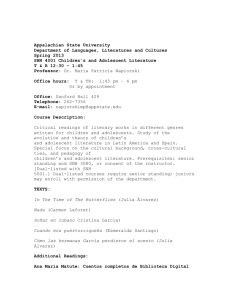
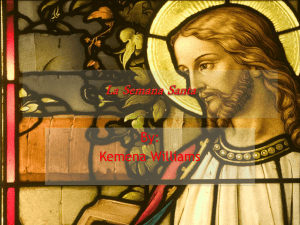
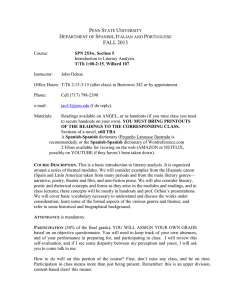
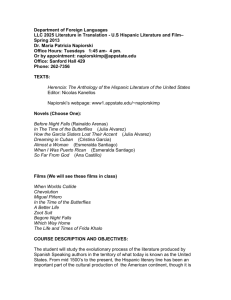
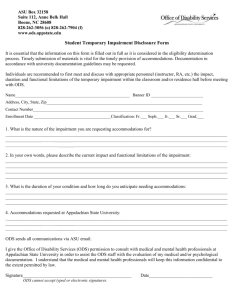
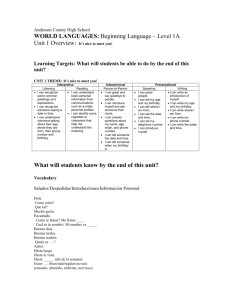
![[updated 1.27.16] - UF Spanish and Portuguese Syllabi](http://s3.studylib.net/store/data/009480414_1-bb401a03e72207b3aa9a3ee4243857b2-300x300.png)
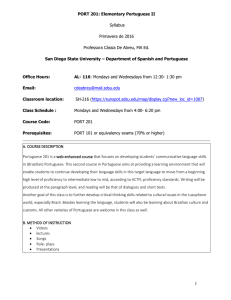
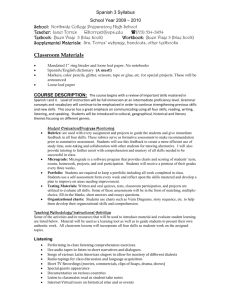
![SPN3520_Silabo Fall2015 [Completo]](http://s3.studylib.net/store/data/008549623_1-b112ac96bacea6498f0f01910c2fbd3e-300x300.png)

